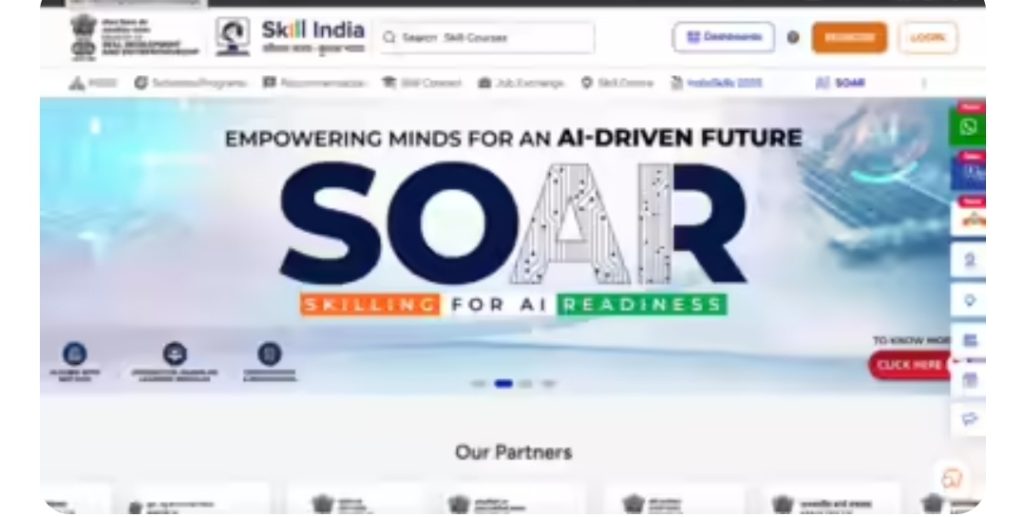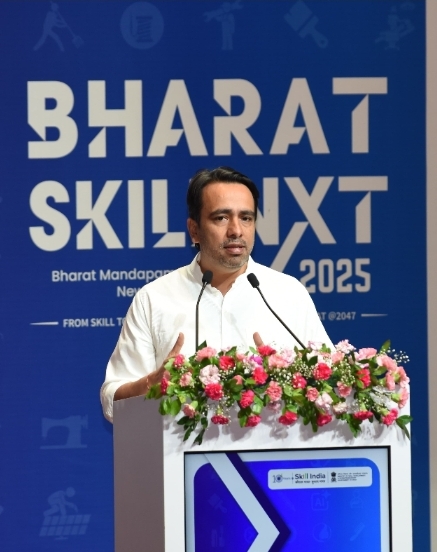SOAR Initiative: Transforming India’s Educational Landscape Through AI Readiness
When you walk into a classroom today, you might witness students engaging with textbooks and traditional teaching methods. However, something revolutionary is quietly reshaping the educational foundations across India. The launch of the SOAR (Skilling for AI Readiness) initiative by the Ministry of Skill Development and Entrepreneurship represents a groundbreaking shift toward AI-integrated learning. This program transcends conventional educational approaches. Instead, it positions artificial intelligence as the cornerstone of future-ready skill development for millions of students nationwide.
Skilling for AI Readiness: Understanding the SOAR Framework
The SOAR initiative operates through a meticulously structured framework. Moreover, it addresses different learning stages systematically. The program comprises three progressive 15-hour modules designed specifically for students across different academic levels. Each module builds upon previous learning while introducing increasingly sophisticated AI concepts.
AI to be Aware serves as the foundation module for students in grades 6-8. This introductory phase focuses on basic AI awareness. Furthermore, it demonstrates how artificial intelligence already influences daily life experiences. Students explore fundamental concepts of machine learning and neural networks. Additionally, they gain exposure to various AI technologies currently transforming industries worldwide.
AI to Acquire targets students in grades 9-10 with more advanced content. This intermediate module emphasizes practical AI applications and programming fundamentals. Students develop hands-on experience with AI development tools. Consequently, they begin understanding how to create basic AI solutions for real-world problems.
AI to Aspire represents the most advanced student module for grades 11-12. This comprehensive phase explores ethical AI considerations and career pathways. Students examine AI’s societal impact and potential employment opportunities. Meanwhile, they develop critical thinking skills necessary for responsible AI implementation.
Skilling for AI Readiness: Empowering Educators Through Comprehensive Training
Teachers form the backbone of successful AI education implementation. Therefore, the SOAR program includes a dedicated 45-hour AI for Educators module. This comprehensive training equips educators with essential knowledge and teaching methodologies. Furthermore, it addresses the digital literacy gap that often prevents effective technology integration.
The educator module covers diverse topics including generative AI applications and cybersecurity principles. Teachers learn to incorporate AI tools into classroom instruction effectively. Additionally, they develop skills for guiding students through ethical AI considerations and career planning discussions.
Skilling for AI Readiness: Strategic Partnerships Driving Excellence
The SOAR initiative benefits from robust partnerships with industry leaders. Microsoft, HCL Tech, and NASSCOM Sector Skill Council collaborate as awarding bodies for content development. These partnerships ensure that curriculum content meets international standards. Moreover, they provide students with industry-relevant skills and certifications valued by employers globally.
Microsoft’s involvement particularly enhances the program’s technical depth. Their expertise in AI education and cloud technologies strengthens curriculum quality. Similarly, HCL Tech contributes practical industry insights and real-world application examples. NASSCOM’s participation ensures alignment with sector skill requirements and employment market demands.
Customer Experience Transformation in Educational Settings
The integration of AI in educational environments fundamentally transforms customer experience dynamics. Students, parents, and educators all benefit from enhanced service delivery and personalized interactions. AI-powered systems streamline administrative processes while providing 24/7 support capabilities.
Educational institutions implementing AI technologies report significant improvements in student engagement levels. Personalized learning platforms adapt to individual student needs and learning styles. Consequently, students receive customized content that matches their academic progress and personal interests.
Administrative efficiency gains represent another crucial customer experience enhancement. AI systems automate routine inquiries about enrollment, course selection, and academic requirements. This automation reduces response times while freeing staff to focus on complex student support needs.
Bridging the Digital Divide
The SOAR initiative specifically addresses India’s digital divide challenges. Rural and urban students gain equal access to high-quality AI education resources. This democratization of technology education supports the government’s inclusive development goals.
Online learning platforms enable students from remote areas to participate fully. Additionally, self-paced modules accommodate diverse learning schedules and environments. The program’s accessibility features ensure that socioeconomic barriers don’t prevent AI literacy development.
Schools are encouraged to establish AI labs and student-led AI clubs. These initiatives foster collaborative learning and peer-to-peer knowledge sharing. Furthermore, they create environments where students can experiment with AI technologies safely.
Impact on Future Workforce Development
The SOAR program aligns with broader workforce preparation strategies for an AI-driven economy. Early AI exposure helps students develop confidence and competence in technology-enhanced work environments. This preparation becomes increasingly vital as AI transforms job requirements across industries.
Research indicates that AI will reshape rather than replace most jobs. Workers equipped with AI literacy skills will adapt more successfully to evolving workplace demands. The SOAR program ensures that Indian students enter this transformed job market with competitive advantages.
Technical skills development represents only one aspect of workforce preparation. The program also emphasizes critical thinking, problem-solving, and ethical reasoning capabilities. These uniquely human skills complement AI technologies and remain essential for professional success.
Overcoming Implementation Challenges
Despite its transformative potential, the SOAR initiative faces several implementation challenges. Infrastructure limitations in some regions may restrict access to digital learning resources. Internet connectivity issues could impact online module delivery and assessment processes.
Teacher training represents another critical challenge area. Many educators require substantial professional development to integrate AI concepts effectively into their teaching practice. Additionally, resistance to technological change among some faculty members may slow adoption rates.
Budget constraints at institutional levels could limit program implementation scope. Schools may struggle to invest in necessary hardware and software infrastructure. However, the program’s self-paced, online delivery model helps minimize these financial barriers.
Measuring Success Through Data-Driven Approaches
The SOAR initiative incorporates comprehensive assessment and certification mechanisms. Built-in evaluations track student progress throughout each module. These assessments provide valuable data for continuous program improvement and effectiveness measurement.
Predictive analytics capabilities help identify students who may need additional support. Early intervention systems can provide targeted assistance before academic challenges escalate. This proactive approach improves overall learning outcomes and student retention rates.
Performance tracking data also supports institutional decision-making processes. Educational administrators can allocate resources more effectively based on student engagement patterns and learning analytics insights.
Global Competitiveness and Innovation
The SOAR program positions India as a global leader in AI education implementation. Minister Jayant Chaudhary emphasized India’s goal of building the world’s largest AI-ready school population. This ambitious vision reflects the country’s commitment to technological advancement and educational innovation.
International competitiveness requires students who can collaborate effectively in global AI development projects. The SOAR curriculum includes components addressing cross-cultural communication and international collaboration skills. These capabilities prepare students for participation in worldwide AI research and development initiatives.
Innovation capacity development represents another crucial program outcome. Students learn to identify problems suitable for AI solutions and develop creative approaches to implementation. This innovation mindset supports India’s broader economic development and technological leadership aspirations.
Skilling for AI Readiness: Long-term Vision and Sustainability
The SOAR initiative contributes to India’s Viksit Bharat 2047 vision of creating a developed, digitally empowered nation. This long-term perspective ensures that program design considers future technological trends and workforce requirements. Continuous curriculum updates will maintain relevance as AI technologies evolve.
Sustainability mechanisms include ongoing partnerships with industry leaders and educational institutions. These collaborations provide resources for program expansion and quality maintenance. Additionally, the certification structure creates pathways for advanced AI education and career development.
The program’s impact extends beyond immediate participants to influence broader educational system transformation. Schools implementing SOAR modules often adopt additional technology integration initiatives. This ripple effect accelerates overall digital transformation in Indian education.

Creating Tomorrow’s AI Leaders
The SOAR initiative represents more than a educational program—it embodies India’s commitment to nurturing the next generation of AI innovators and ethical technology leaders. Through systematic exposure to artificial intelligence concepts from grades 6 through 12, students develop both technical competencies and critical thinking skills necessary for responsible AI development and deployment.
As artificial intelligence continues reshaping industries and society, programs like SOAR ensure that students are prepared not just to adapt to these changes, but to lead them. The initiative’s emphasis on ethics, creativity, and collaborative problem-solving creates a foundation for sustainable AI advancement that benefits all of humanity.
The transformation is already beginning. Thousands of students across India are now accessing these free, self-paced certification modules through the Skill India Digital platform. Each student who completes these programs becomes an ambassador for AI literacy in their communities, creating a multiplier effect that will define India’s technological future.
Through SOAR, India is not merely preparing students for an AI-driven world—it is empowering them to create that world responsibly, innovatively, and inclusively.

